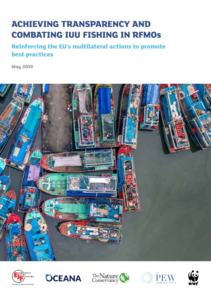During the International Day Against IUU fishing, June 5, five organizations launched a report outlining the minimum transparency and anti-IUU fishing measures deemed vital for Regional Fisheries Management Organizations (RFMOs). The recommendations span from the point of harvest (where identification and tracking of vessels activities are needed), through the landing, transportation and trade of fish products, including traceability systems along the value chain.
According to the report, it is estimated that one in five wild caught fish is fished illegally, the product of an illicit global business worth billions each year, corresponding to at least 15% of the world’s catches. In their perpetual quest of ever higher profits, IUU operators move from one region to another where regulations and the means used to enforce the law are weaker
IUU fishing results to significant social, economic and environmental damage.
The negative impacts IUU fishing provides are:
- It adds pressure to already overexploited fish stocks, while simultaneously compromising efforts to rebuild them based on scientific advice;
- It distorts global fish markets and prices, leaving legal fishermen disadvantaged.
The EU should and does show leadership in increasing transparency and countering IUU fishing, as it accounts for around 5% of total fisheries worldwide, ranking fourth after the three main Asian producers of China, Indonesia and India.
In the meantime, EU fishing activities within RFMOs account for roughly 18% of the EU’s total landed weight of seafood catches (839 thousand tonnes) and 19% of the total value (EUR 1.4 billion).
The Environmental Justice Foundation (EJF), Oceana, The Nature Conservancy, The Pew Charitable Trusts and WWF are working together to ensure that the EU’s engagement with RFMOs and key partners leads to strong transparency and anti-IUU measures worldwide.
In light of the above, the EU IUU Coalition call the EU to:
- Continue leading on promoting transparent fisheries governance at a global level;
- Build alliances with RFMOs’ CPCs in intensifying efforts to effectively implement measures for tackling IUU fishing practices;
- Establish (when not in place) and enforce RFMO measures that would trigger action against CPCs in cases of non-compliance.
Moreover, the report outlines the minimum transparency and anti-IUU fishing measures that are crucial for RFMOs to adopt and also implement from the point of harvest, through the landing, transportation and trade of fish products, including traceability systems along the value chain.
Concluding, Max Schmid, Deputy Director of EJF noted
The EU is leading the world with its measures to combat IUU fishing and stop illegal product entering the common market. Now is the time to use that same positive influence to help RFMOs eradicate IUU fishing through effectively implemented and enforced measures.
A key aspect of this will be promoting transparency in fisheries, which can be achieved using simple, low-cost measures that are within reach of all regions.
Explore more by clicking on the PDF herebelow































































